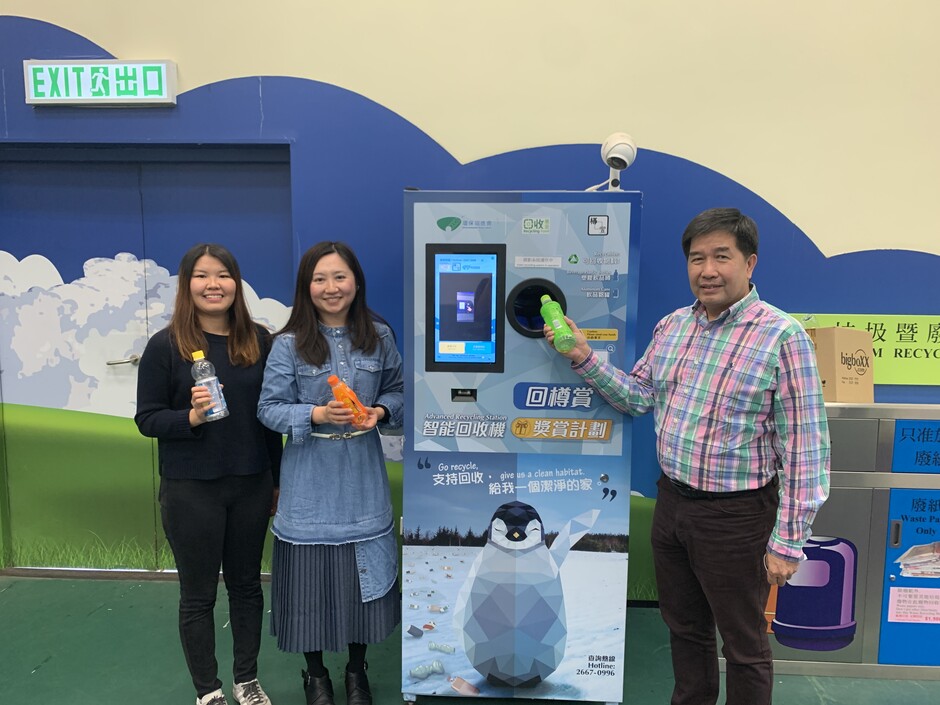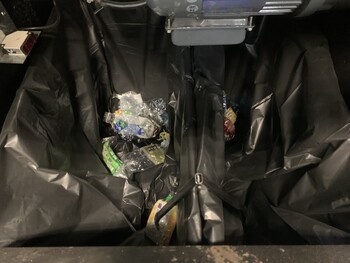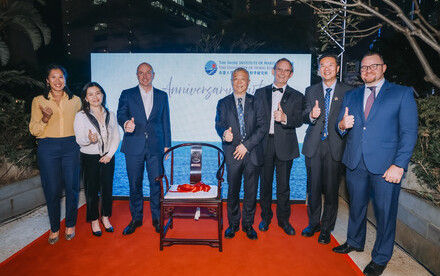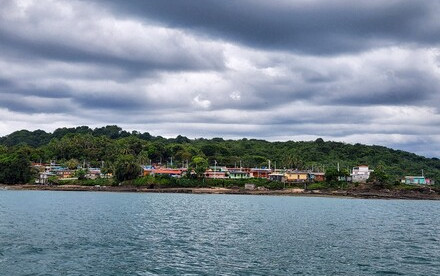02 Mar 2021
HKU-led research promotes territory-wide extension of plastic bottle deposit scheme

From the left : Jade LAM (student from HKU MSc in Environmental Management Programme), Dr Janet CHAN (Lecturer from HKU Research Division for Ecology and Biodiversity),and Dr Wing Kwong YAU (CEO of Environmental Association Limited).
Plastic waste problem has become increasingly serious in Hong Kong. Roughly 20% of plastic solid waste is disposed to landfills every year, despite its high recycling potential. In view of this, a HKU research team from Research Division for Ecology and Biodiversity collaborated with the Environmental Association Limited, aiming to explore the feasibility of implementing plastic bottle deposit in Hong Kong. The results found that a proper recycling point could build citizens’ trust on plastic recycling. The suggested bottle deposit scheme could help to recycle over 56 million plastic bottles in a year, and more than 60% of the interviewees indicated their support towards the scheme.
The study has also developed a framework for the plastic bottle deposit system, suggesting consumers to pay HK$1 refundable deposit and HK$0.5 handling fee for each plastic bottle beverage. Echoing the Waste Blueprint for Hong Kong 2035 released by the HKSAR Government in early February, this study provides useful data for implementing the Producer Responsibility Scheme on Plastic Beverage Containers, a new measure proposed by the Government. The results reveal how bottle deposit scheme reduce plastic bottle waste, help to achieve circular economy and reduce waste to be landfilled.
Reversing plastic pollution
The Environmental Association Limited has introduced Reverse Vending Machines to Hong Kong since 2009, with the aims to promote recycling and to understand the difficulties faced by the recycling industry.
A Master’s research led by Dr Janet CHAN from HKU Research Division for Ecology and Biodiversity and assisted by her student Ms Jade LAM from the Master of Science in Environmental Management Programme, studied the public recycling habits, the incentives for citizens to recycle, the relationship between recycling location and recycling rate, as well as the examples of bottle deposit schemes in foreign countries. During the research, a total of 130,000 beverage containers had been collected in the study period, and 327 Hong Kong citizens were interviewed on their attitude to recycling of plastic bottles.
There are about 300 Reverse Vending Machines recently in Hong Kong, with around 2,000 beverage machines in the territory. This study estimates that at least 2,000 Reverse Vending Machines are needed for Hong Kong to recycle plastic bottles effectively.
Confirming the feasibility of extending the plastic bottle deposit scheme
Through this research, the team has confirmed the feasibility of plastic bottle deposit scheme in Hong Kong. Jade Lam from the Master of Science in Environmental Management Programme said, “More than 70% of the interviewees do recycling because of their environmental considerations. The result shows that a proper recycling method could improve citizen’s confidence towards bottle recycle.” She added, “More than 60% of the interviewees support the bottle deposit scheme, reflecting that the general public have a positive attitude towards the scheme.”
To develop a framework for the plastic bottle deposit system, this research case studied the schemes implemented in Norway, Germany, Hawaii, South Korea, which play leading roles in plastic bottle waste management. The suggested framework includes: 1) a short-term goal: a plastic bottle labelling registration system which is similar to that of South Korea for glass bottles. In this registration system, all imported beverages in plastic bottles must be registered so that the beverage importers could receive the deposit refund; 2) a long-term goal: a comprehensive recycling system which is referenced to that implemented in Norway. In this recycling system, for example, a consumer needs to pay HKD$1 refundable deposit and HKD$0.5 handling fee for each plastic bottle beverage.
This study estimates that 2,000 Reverse Vending Machines are required to achieve the long-term recycling goal. Dr Janet Chan opined,“ Plastic waste is an imminent environmental crisis no matter in Hong Kong or around the world. I am delighted to see this study provides concrete figures and a down-to-earth framework for effective recycling of local plastic bottles. It demonstrates how Reverse Vending Machines support the Producer Responsibility Scheme on Plastic Beverage Containers, a new measure proposed by the Government very recently.”
Dr Wing Kwong YAU, CEO of Environmental Association Limited said, “We introduced Reverse Vending Machines to HK since 2009, with roadshows and demonstrations at shopping malls, residential estates and sports facilities. Reverse Vending Machines are common in foreign countries and provide strong incentives to increase the recycling rate. The findings of this study are valuable and reflect local citizens are still not very familiar with Reverse Vending Machines yet. Bottle deposit will also be a useful tool to encourage recycling and support the recycling industry by steadying the recycling rate and ensuring the quality of recyclables. Based on the suggestions of HKU, 2,000 machines can avoid more than 56 million plastic bottles ending up in the landfills. Based on our 10 years’ experience in managing the machines and the findings of this study, we provide a solid ground for the Government to consider implementing the bottle deposit scheme.
About Environmental Association Limited
The Association aims to promote environmental education and conservation through workshops, trainings, programmes and public participation. Established in 1997 and a registered charity, the Association’s mission is made possible through the passion of volunteers, support of local community, and devotion of the staff members. It now operates four environmental centres including, Taipo Market Recycling Store, Taipo Geoheritage Centre, Fung Yuen Butterfly Reserve, EWise Discovery Centre.
Click here for the link to the research paper.
There are about 300 Reverse Vending Machines in Hong Kong. This study estimates that 2,000 Reverse Vending Machines are required to achieve the long-term recycling goal. |
Recyclables in Reverse Vending Machine will be compressed for easier transportation. |








